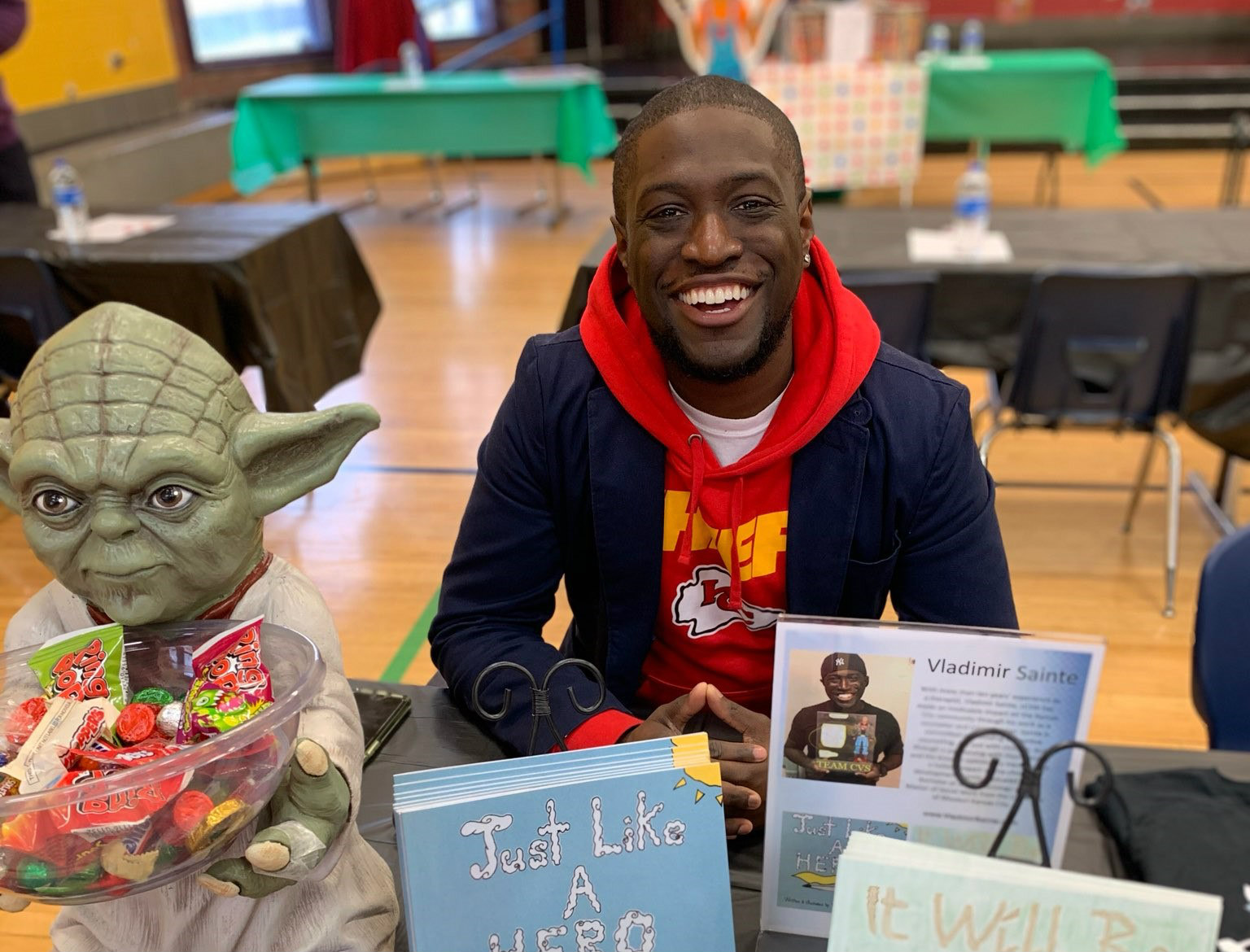Our ongoing story starts with people from around the world, converging here at UMKC. Get to know our people and you'll know what UMKC is all about.
Vladimir Sainte, LCSW
Hometown: Queens, New York
UMKC degree program: B.A., sociology ’07, Master of Social Work ‘10
Vladimir Sainte is helping children by carrying forward the mentoring he received as a young man. Originally from Queens, New York, his mother sent him to live in Kansas City with his uncle, William Jacob, hoping he would be a good mentor for Sainte. Her strategy was a success; Jacob instilled a love of learning and a desire to give back.
Could you tell us a little about your work?
I’m a team leader for client care in mental health at Truman Behavioral Health, and worked previously as a counselor and crisis clinician. I also write children’s books to create inclusive literature to increase awareness of diversity and tolerance.
Why did you choose this career/field?
As an undergraduate, I knew I wanted to get my master’s degree. I took Introduction to Social Work with Grey Endres. He’s this great guy who wears Hawaiian shirts and superhero belts to class. He showed me that social work can be a profound and beautiful career – where you get to play with kids all day!
"With power comes great responsibility."
How did you become an author?
I was working with a black boy who was struggling with his identity. I was looking for a book that might help him and I couldn’t find anything, so I decided to write one myself. I wrote “Just Like a Hero” – a story about Will, a black boy who is coping with daily struggles – to highlight the importance of personal value. I didn’t expect it to escalate, but I’m happy it’s been recognized. My books are designed as a reminder of how important we all are.
The other reason I focused on a young black boy in my first book is because I wish I’d had something like this growing up. Throughout my career, I’ve seen that some people in the African American culture can treat mental health issues as taboo. If we know someone who has mental health issues – that person is crazy. We don’t talk to them. It’s like a plague. And we act as if we ignore it, maybe it will go away.
I wanted to reach diverse backgrounds through boys or girls who look like me.
"We need to accept people as they are – shine the flashlight on that – and let them know if things are difficult that it’s not going to be this way forever.”
What did you most appreciate about UMKC?
Meeting my wife, who was in the social work program with me. We were friends first. She has been my rock and my pillar through my career and my books. I can be in the clouds – she is analytical. She’s instrumental to my process.
How did UMKC and your UMKC connections help prepare you for your career?
Elaine Spencer-Carver, School of Social Work’s director of field education, saw the potential in me. I saw Grey Endres as a mentor. He taught my last undergraduate class and I told him I’d applied to the MSW program. He helped place me in my practicum at Gillis Center my last year in the program and it became my first job.
Do you have a personal motto or words you live by?
I love comic books, and Spiderman’s motto has always resonated with me.
“With great power comes great responsibility.”
As a social worker, I am an agent of change – that has great power. Kids learn through their environments. If we’re stressed, they feel that. We need to show acceptance, support and compassion. We need to accept people as they are – shine the flashlight on that – and let them know if things are difficult that it’s not going to be this way forever.
Who has been a great influences in your life?
My uncle, William Jacob, who was an engineer in Kansas City, was very influential. When I was a 16-year-old kid living in New York, I hung out with kids who weren’t interested in school. I wasn’t interested in school. I had terrible grades and was searching for connection, which I found with the wrong group of people. He and my mother came up with the plan for me to move to Kansas City so he could mentor me. He saw my potential, even though I didn’t. Every Tuesday night after watching The Andy Griffith Show, he’d sit down with me to do one hour of algebra. I hated it, but he pushed me. He made me enjoy education. With his influence, I saw a future for myself.
"Every Tuesday night after watching The Andy Griffith Show, he’d sit down with me to do one hour of algebra. I hated it, but he pushed me. He made me enjoy education. With his influence, I saw a future for myself.”
How are you now using your influence to impact others?
I hope I’m helping to break down the stigma of mental illness by raising awareness in children. For me, that’s through creating books that talk about mental health. It’s important for kids to understand that it’s OK to be anxious or depressed, but you have worth. You are important. Mental health struggles don’t signify or create a boundary. My first book, “Just Like a Hero,” is about a young black boy, and the second, “It Will be Okay,” is about a Latina girl. The third and fourth books also feature children of color with their own challenges.
Recently, I spoke at Turner Middle School. A girl came up to me after my presentation and thanked me. She said she’d struggled with feeling sad for herself, and that she doesn’t feel important. My presentation helped her understand that she can talk about that. It was breathtaking to hear.

